What It's Like to Be a Presidential Campaign Field Organizer
Every four years, hundreds of young people pack up their lives and move to Iowa to knock on doors in support of a presidential candidate.
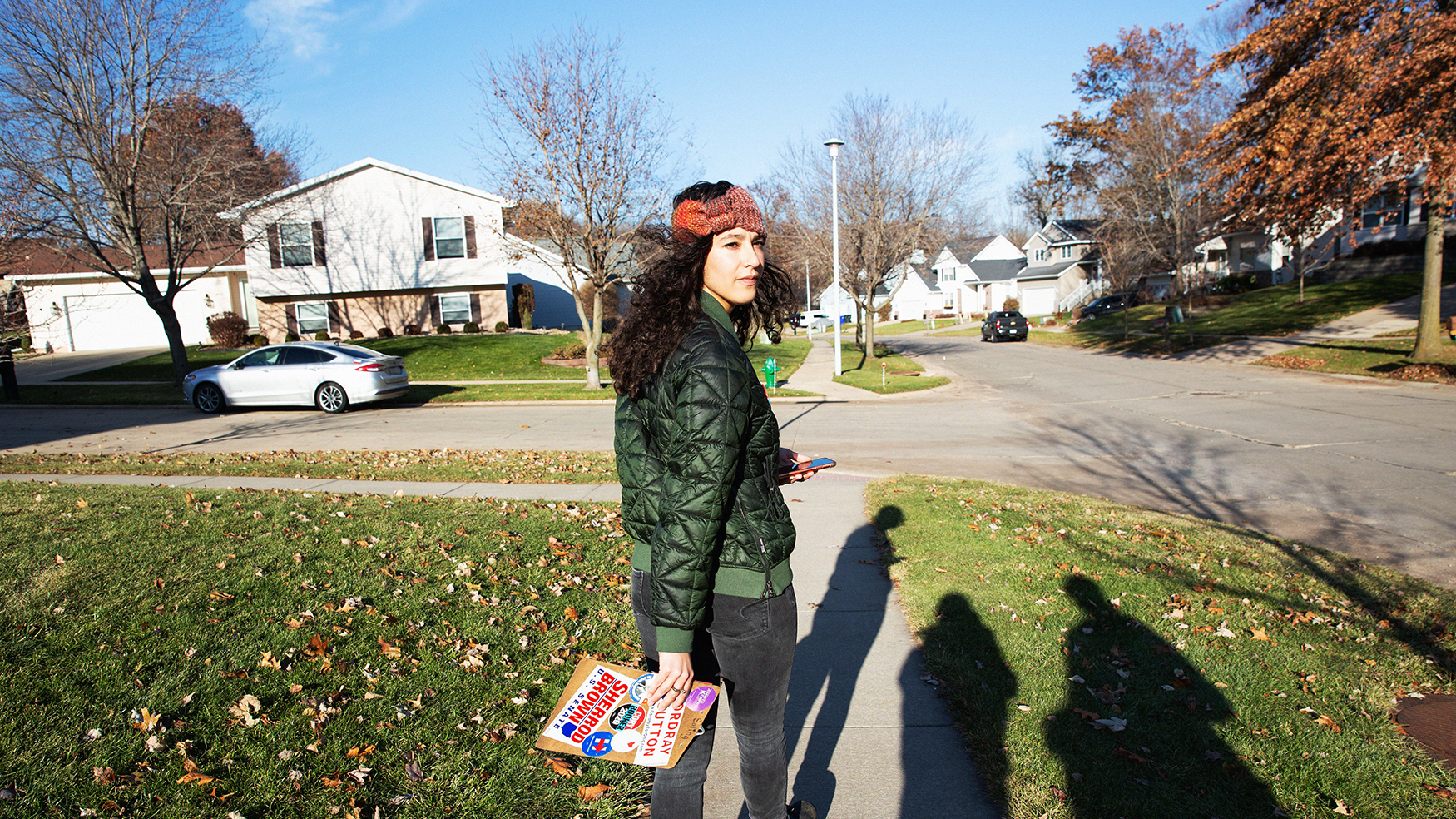

Maranda Saling and Sam Knapp have a lot in common. They’re both young and new in town, and they’re both the kind of people who eat, sleep, and breathe politics. On November 23rd, a bright and biting Saturday afternoon, they were even wearing the same boots: black Blundstones over wool socks. But Knapp and Saling were on rival teams, competing for the attention and commitment of the same would-be voters in Cedar Rapids, Iowa, as the all-important Iowa caucuses hurtle closer every day.
Knapp, 22, was working as a field organizer for the struggling Kamala Harris campaign. She was born and raised in Washington, D.C., and as a college sophomore in 2016, she volunteered for Democratic nominee Hilary Clinton. When Donald Trump won, “I was like ‘I wanna go to Iowa, and I wanna work on a campaign,’” she said. She joined the Harris campaign first as a summer fellow; by November, she was spending most of her time thinking about how to get as many people as possible to sign their names on a CTC (a commitment to caucus card) and show up to their caucus locations on the night of February 3, 2020. (Once there, Iowans don’t cast ballots: They vote with their bodies, making good on their CTCs by physically standing alongside their candidate’s other supporters.)
Across town, at the Cory Booker for Linn County field office, Maranda Saling has exactly the same goal, except that her CTCs aren’t purple and yellow, they’re red, white, and blue. Saling, 30, is originally from a small city in northeastern Ohio, where she did PR work and fundraising before getting involved in campaigns for ballot initiatives aimed at boosting funding for parks, schools, and libraries. She was working overseas as a freelance writer when the Booker campaign called and asked her to come work in Iowa. So in May she moved from Bali, Indonesia, to Marion, Iowa, and set about doing what field organizers do: learning everything there is to know about a community.
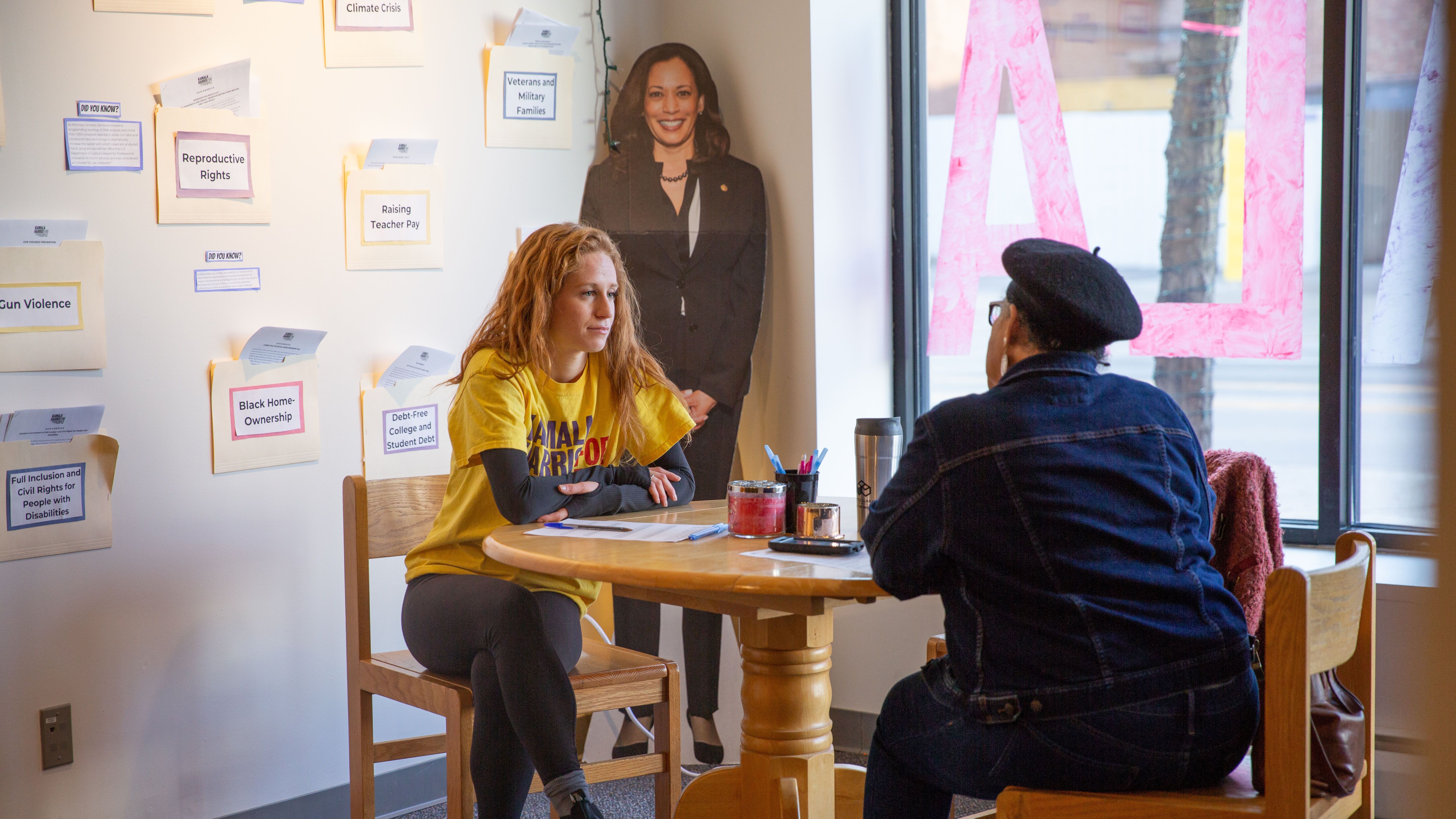
Sam Knapp (left) chats with a volunteer phone-banker in the Kamala Harris campaign's Cedar Rapids field office.
Most field organizers don’t relocate from Bali, but they do uproot their lives, moving from across to the country to a town they’ve likely never even seen before. They live in “supporter housing”—basements and spare bedrooms lent to the campaign by devoted volunteers—and dedicate their lives to a campaign that could end any time between when they arrive and election day.
Both Knapp and Saling have spent the last six months going to community events—soup suppers, pride parades—and setting up one-on-one coffee meetings with as many people as they can. Their job is to convince those people to join their candidate’s team as a caucus-goer, and to get them to bring their friends, family, and neighbors along with them when they do. Politics is a contact sport. Specifically, voter contact.
With approximately 200 people (okay, fine, 15) running for the Democratic nomination this cycle (and all but two of them contesting the Iowa caucuses) campaigns are competing especially hard for every single CTC. The Des Moines Register reported recently that in the month of October, across the state, the campaigns held a combined 7,230 events designed to get voters excited about the candidates and move them towards a caucus commitment. The Biden campaign hosted a potluck dinner. Julian Castro’s campaign “hosted a book club focusing on LGBTQ literature.” The Booker campaign hosted a river cleanup day. The Harris campaign arranged “Kayaking for Kamala.”
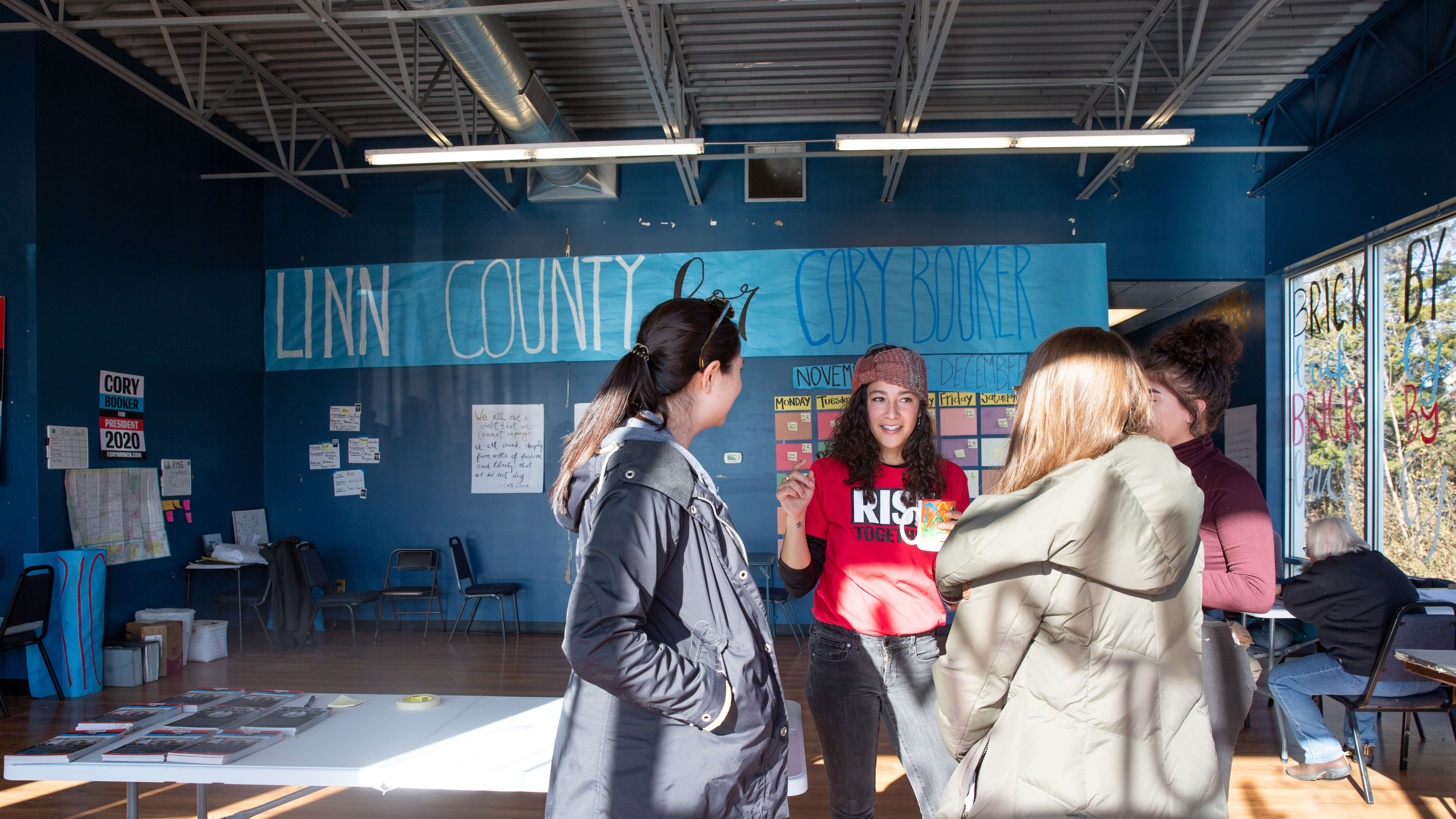
Maranda Saling (center) talks with fellow Booker campaign workers and the author in the campaign's Linn County field office in Cedar Rapids.
There are ways to reach voters who don’t want to go kayaking or come to your potluck, the most labor-intensive of which is door-knocking. On Saturday, while organizers at their field officers supervised phone-banking and volunteer trainings, Knapp and Saling went knocking on doors.
Stay In The Know
Get exclusive access to fashion and beauty trends, hot-off-the-press celebrity news, and more.
Suited up in warm weather gear and armed with “packets”—lists of about 20 houses that, according to voter registration records, contain registered Democrats or people who’ve voted for Democrats before—they each headed out into Cedar Rapids.
Knapp started in a working class neighborhood a short drive from the field office. At the very first door she knocked on, success: The man in her packet was home, he answered the door, he was willing to talk to her, and, improbably, he signed a CTC. The whole thing took less than three minutes. “I’m telling you, this is a magic precinct,” she said, as she walked back down his front steps. “I couldn’t have staged that better myself.”
It doesn’t always go this way. Although most door-knocking happens on weekday evenings or on the weekends, people often aren’t home, or they are and they don’t answer the door. At the next house, a man answered the door shirtless.
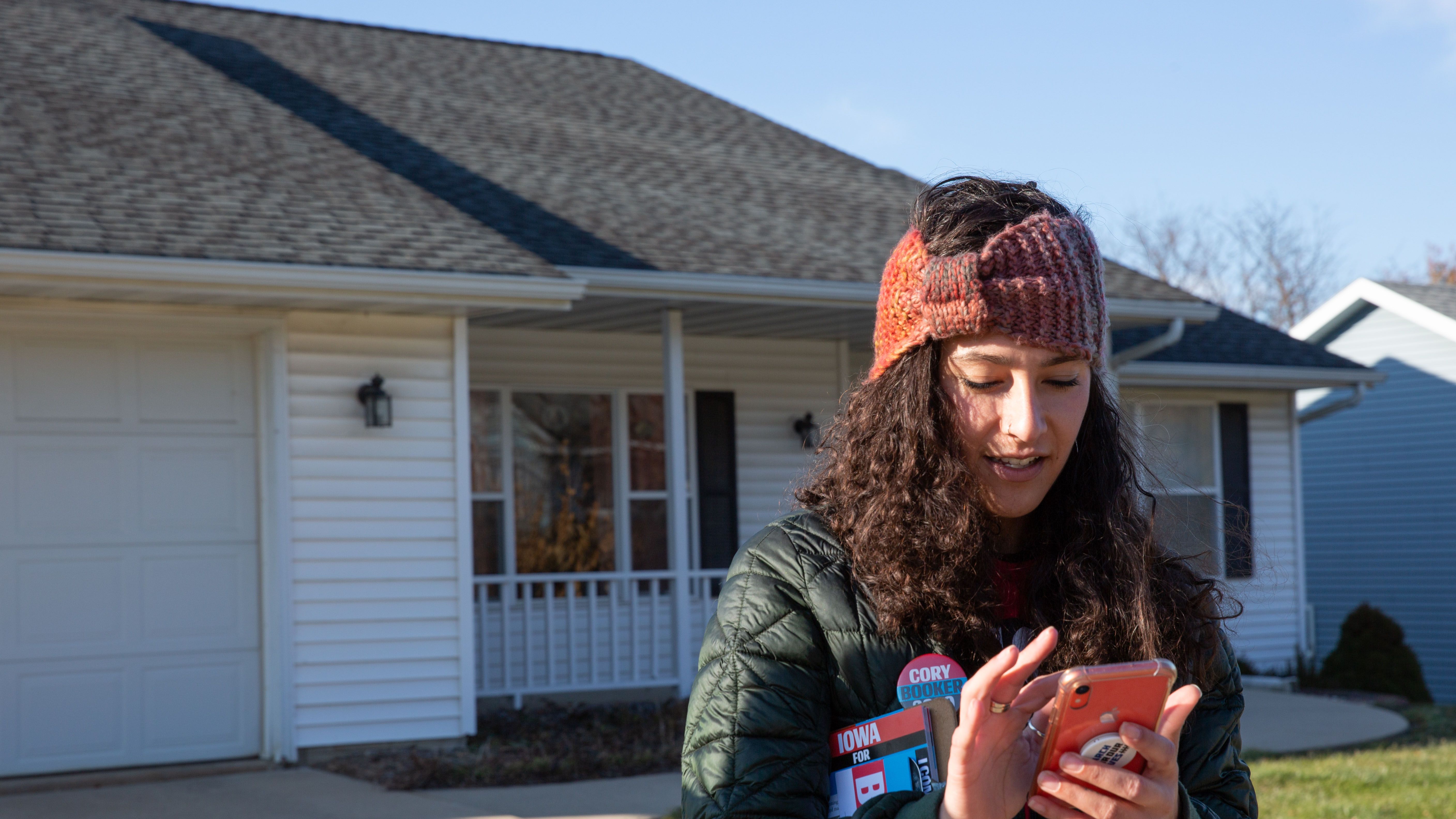
Saling makes a note about an unsuccessful voter contact. The voter at this house, an older woman, told Saling she was done with politics but that she was glad to see a young person doing the work.
Had Knapp ever worried for her safety while out door-knocking on her own? “I’ve never felt unsafe,” she said, after leaving some campaign literature with the shirtless man. “But if it was up to my parents I might play it a little safer.”
Across town, Saling was door-knocking in a middle class neighborhood, a precinct that felt decidedly un-magic. At her first house, the middle-aged man who answered said he’d never heard of her candidate, and that he thought the election was rigged anyway. Saling listened to his concerns, and relentlessly brought everything he said back around to Cory Booker. “I think Senator Booker would agree with a lot of that…” “Well, that’s why Senator Booker says…” “It sounds like you and Senator Booker share a lot of the same values…” In the end, he agreed to take a look at some of the literature she left with him.
At the next house, her packet directed her to talk with a would-be voter named Janice, but it was Janice’s husband who opened the door. Janice’s husband had heard of Booker, and knew that Booker isn’t polling well. He was delighted because he’s a proud and satisfied Trump supporter. Janice, he said, is “totally against Trump,” and when Trump won, “this almost became a divorce.”
Saling didn’t try to convince Janice’s husband to caucus for Booker, but she did hand him some campaign literature, and he grudgingly said he’d give it to Janice. Walking away, Saling seemed to think that was unlikely.
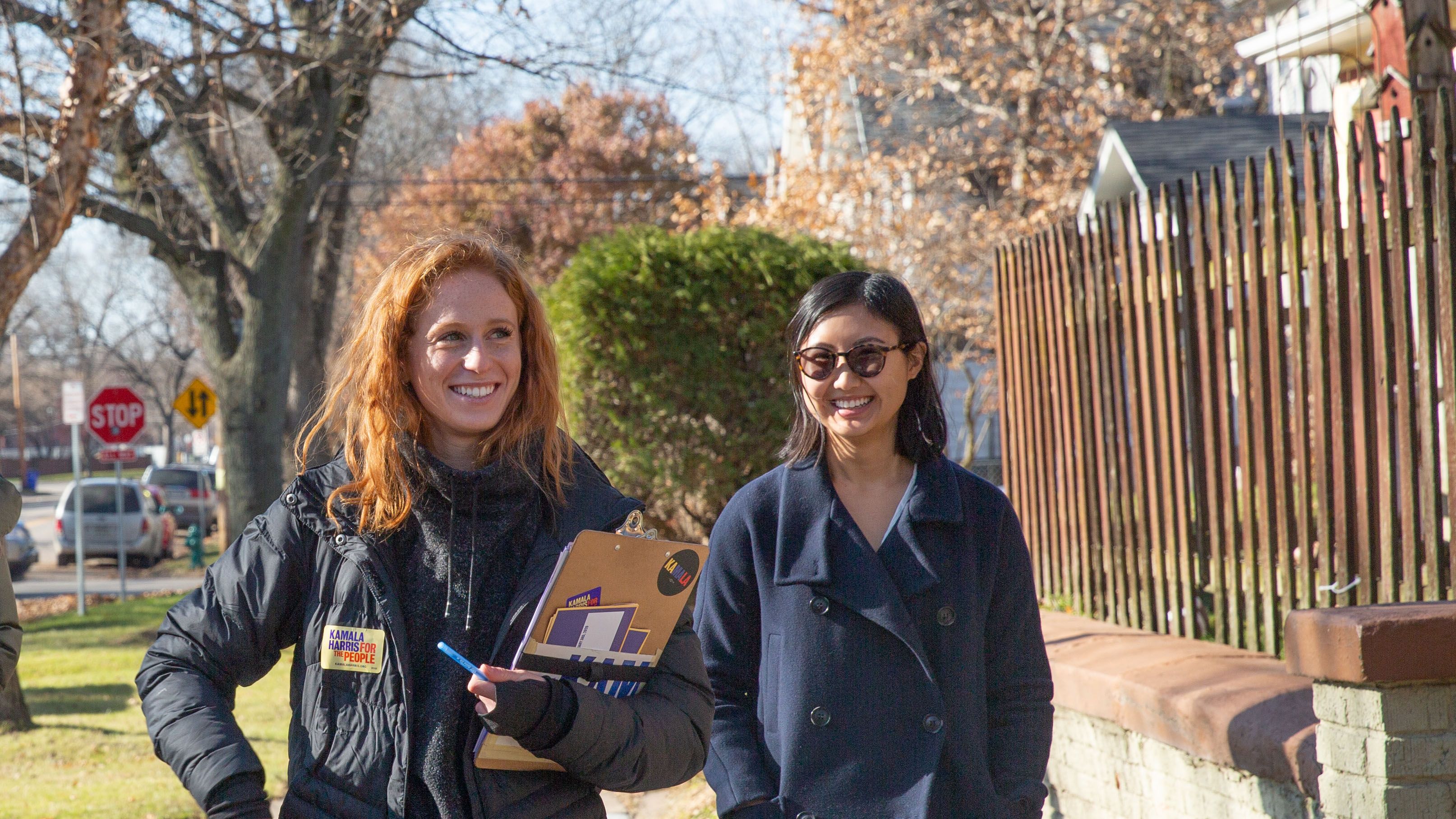
Knapp and Sharon Yang, the campaign's Iowa Press Secretary, out door-knocking.
“Husbands-as-blockade happens a lot of the time,” she said. “Sometimes you’ll see the wife on sitting on the couch and he’s like, ‘she’s not home.’ But she’s sitting right there!” Or, she said, when she’s out on the doors, “[a husband] will see us coming up the sidewalk and get to the doorbell before we do” so his wife can’t talk to the organizers.
“It’s well-known in field organizing,” she said as we drove back to the field office. “The Republican husband.”
With this packet completed, Saling reaches for the next one—she said that she knocked on about 70 doors a day, every day that week—and her day will end with phone banking, and then an evening team call that finishes around 8:30. “We don’t have evenings.”
Knapp, meanwhile, was headed to a hair salon. The Harris campaign had been focusing on voter contact with Black women in salons and with Black men in barber shops. Like Saling, she’d spent most of the week planning for this weekend: By the time it was over, the Iowa caucuses would be just 70 days away. Every weekend was another precious chance to convert “I’ll look at the literature” to “I’ll sign a CTC.”
“I’m definitely stressed,” she said. “But I love this job because it’s so intense, it’s ‘What’s next? what’s next?’ just putting my head down and doing it.”
Despite Knapp’s efforts, what’s next wasn’t what she’d hoped. Barely a week later, Harris would announce that she was ending her campaign. Knapp didn’t return requests for comment about what she plans to do now—find work on another campaign, in Iowa or elsewhere?—but she joins legions of political hopefuls who’ve already packed up their placards for Beto O’Rourke or Kirsten Gillibrand. And next week, someone else will be knocking on those same doors she did, this time proffering CTCs for Warren or Klobuchar, Biden or Bernie. Until everyone wakes up on February 4, leaves Iowa behind, and sets their sites on New Hampshire.
For more stories like this, including celebrity news, beauty and fashion advice, savvy political commentary, and fascinating features, sign up for the Marie Claire newsletter.
MORE ON THE DEMOCRATIC PRESIDENTIAL PRIMARY
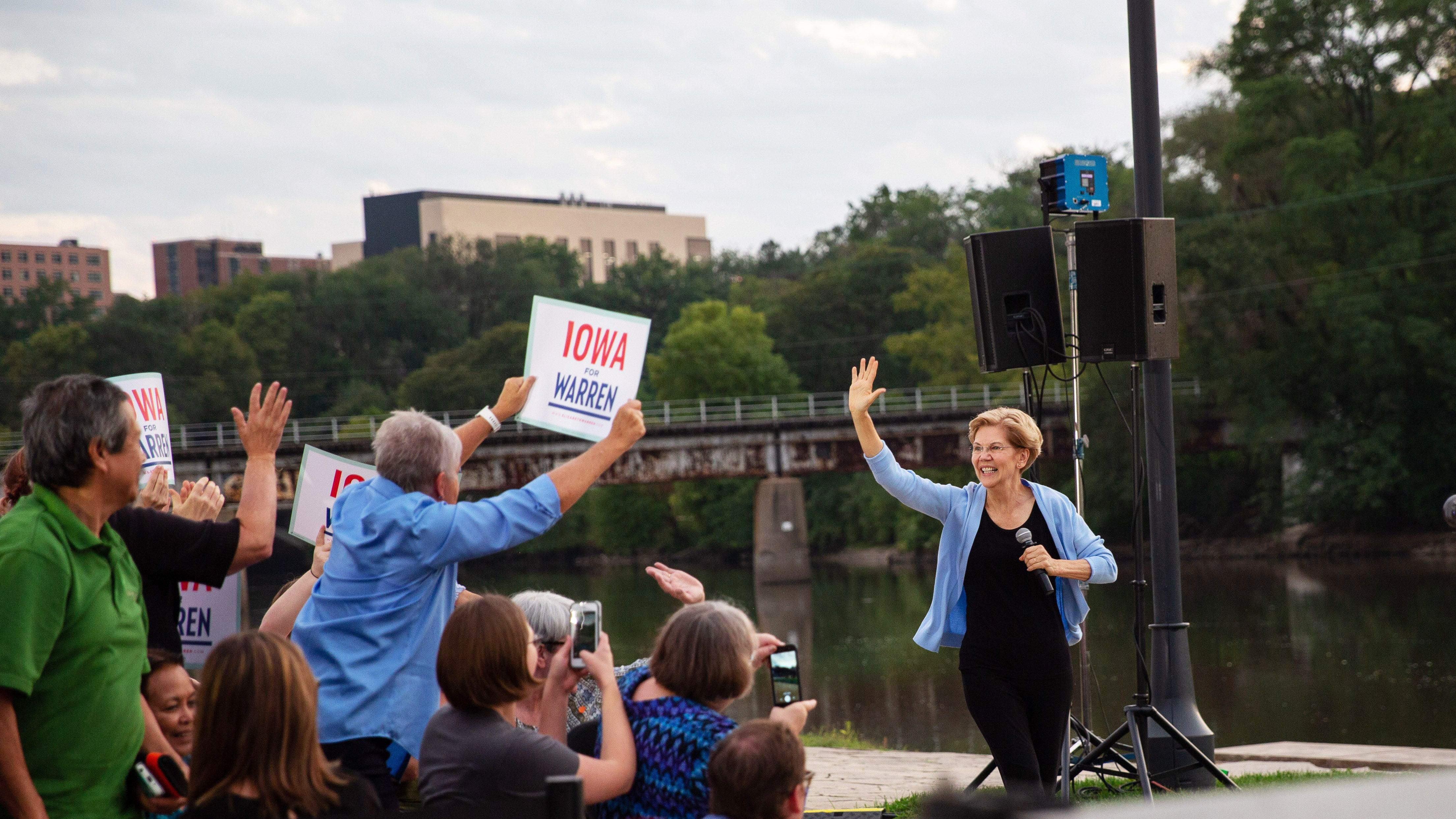

Chloe Angyal is a journalist who lives in Iowa; she is the former Deputy Opinion Editor at HuffPost and a former Senior Editor at Feministing. She has written about politics and popular culture for The New York Times, The Washington Post, The Atlantic, The Guardian, New York magazine, Reuters, and The New Republic. Angyal has a Ph.D. in Arts and Media from the University of New South Wales.
-
 Princess Anne's Unexpected Suggestion About Mike Tindall's Nose
Princess Anne's Unexpected Suggestion About Mike Tindall's Nose"Princess Anne asked me if I'd have the surgery."
By Amy Mackelden Published
-
 Queen Elizabeth's "Disapproving" Royal Wedding Comment
Queen Elizabeth's "Disapproving" Royal Wedding CommentShe reportedly had lots of nice things to say, too.
By Amy Mackelden Published
-
 Palace Employees "Tried" to Get King Charles to "Slow Down"
Palace Employees "Tried" to Get King Charles to "Slow Down""Now he wants to do more and more and more. That's the problem."
By Amy Mackelden Published
-
 36 Ways Women Still Aren't Equal to Men
36 Ways Women Still Aren't Equal to MenFeatures It's just one of the many ways women still aren't equal to men.
By Brooke Knappenberger Last updated
-
 How New York's First Female Governor Plans to Fight for Women If Reelected
How New York's First Female Governor Plans to Fight for Women If ReelectedKathy Hochul twice came to power because men resigned amid sexual harassment scandals. Here, how she's leading differently.
By Emily Tisch Sussman Last updated
-
 Why the 2022 Midterm Elections Are So Critical
Why the 2022 Midterm Elections Are So CriticalAs we blaze through a highly charged midterm election season, Swing Left Executive Director Yasmin Radjy highlights rising stars who are fighting for women’s rights.
By Tanya Benedicto Klich Published
-
 Tammy Duckworth: 'I’m Mad as Hell' About the Lack of Federal Action on Gun Safety
Tammy Duckworth: 'I’m Mad as Hell' About the Lack of Federal Action on Gun SafetyThe Illinois Senator won't let the memory of the Highland Park shooting just fade away.
By Sen. Tammy Duckworth Published
-
 Roe Is Gone. We Have to Keep Fighting.
Roe Is Gone. We Have to Keep Fighting.How To Democracy always offers a path forward even when we feel thrust into the past.
By Beth Silvers and Sarah Stewart Holland, hosts of Pantsuit Politics Podcast Published
-
 The Supreme Court's Mississippi Abortion Rights Case: What to Know
The Supreme Court's Mississippi Abortion Rights Case: What to KnowThe case could threaten Roe v. Wade.
By Megan DiTrolio Published
-
 Sex Trafficking Victims Are Being Punished. A New Law Could Change That.
Sex Trafficking Victims Are Being Punished. A New Law Could Change That.Victims of sexual abuse are quietly criminalized. Sara's Law protects kids that fight back.
By Dr. Devin J. Buckley and Erin Regan Published
-
 My Family and I Live in Navajo Nation. We Don't Have Access to Clean Running Water
My Family and I Live in Navajo Nation. We Don't Have Access to Clean Running Water"They say that the United States is one of the wealthiest countries in the world. Why are citizens still living with no access to clean water?"
By Amanda L. As Told To Rachel Epstein Published